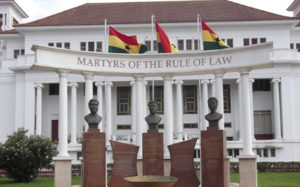Justice Abdulai seeks review of Deputy Speakers voting rights
 Mr Justice Abdulai, the plaintiff in the case that sought the Supreme Court’s interpretation on the voting rights of Deputy Speakers of Parliament when presiding, has filed for a review of the decision.
Mr Justice Abdulai, the plaintiff in the case that sought the Supreme Court’s interpretation on the voting rights of Deputy Speakers of Parliament when presiding, has filed for a review of the decision.
The review application will be heard on April 26, 2022.
The Apex Court on Wednesday, March 9, 2022, ruled that Deputy Speakers presiding over proceedings in Parliament had the right to vote on matters and to be counted as part of the quorum for decision-making in Parliament.
The Court held that Deputy Speaker could count himself for purposes of a quorum and was entitled to an original vote.
It also said Order 109(3) of the Standing Orders of Parliament of the Republic of Ghana was inconsistent with the 1992 Constitution.
“That the decision of Parliament approving the Government of Ghana budget and economic policy for 2022, taken on the November 30th, 2021, with the Deputy Speaker as part of the quorum of Parliament, is valid,” the Court said.
The Supreme Court again said Ghana’s position on the right of the presiding officer of Parliament to vote on a matter was in consonance with the Law or practice in the Commonwealth and Anglo-American Jurisdictions as the United Kingdom, United States, Canada, Australia, Kenya, and South Africa.
It said the decision of Parliament approving the budget and economic policy of Government on November 30, 2021, was valid.
However, the plaintiff, who is a legal practitioner, said it was his submission that the judgment of the Ordinary Bench was per in curium, and constitute exceptional circumstances that resulted in the miscarriage of Justice.
He said there had been a discovery of “new and important matter or evidence which, after the exercise of due diligence, was not within the applicant’s knowledge or could not be produced by him at the time when the decision was given.”
Mr Abdulai argued that the Supreme Court, in adjudicating the matter, failed to consider legislative antecedents before making its final judgement.
He said due to the obscure nature of the 1992 Constitution, relating to the voting rights of Deputy Speakers, it was important for the Court to look at legislative antecedents of Articles 102, 104 (1) & (2), 295(2)(a) of the Constitution which came out of the 1957, 1960, 1969, and 1979 Constitutions and other relevant laws to ensure fairness and justice.
He said this would have revealed to the Ordinary Bench of the Court that the original vote of a Deputy Speaker once existed in Parliament but was repealed by NLCD 406 and never returned.
“It will have also been revealed to them that none of our past Constitutions or enactments ever allowed a Deputy Speaker or a person presiding in Parliament to participate in the quorum of Parliament,” he added.
He said the failure of the Ordinary Bench to consider the above broader context in interpreting the Constitution, they arrived at a decision that was inconsistent with the intention of the Framers of the 1992 Constitution.
The plaintiff said this constituted exceptional circumstance that occasioned miscarriage of justice and therefore the judgment had to be reviewed.
Source: GNA
